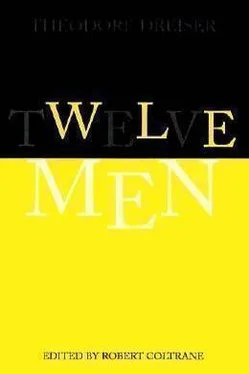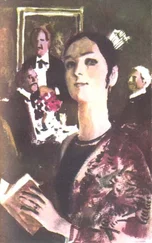Теодор Драйзер - Twelve Men
Здесь есть возможность читать онлайн «Теодор Драйзер - Twelve Men» весь текст электронной книги совершенно бесплатно (целиком полную версию без сокращений). В некоторых случаях можно слушать аудио, скачать через торрент в формате fb2 и присутствует краткое содержание. Год выпуска: 2014, Издательство: epubBooks Classics, Жанр: Биографии и Мемуары, на английском языке. Описание произведения, (предисловие) а так же отзывы посетителей доступны на портале библиотеки ЛибКат.
- Название:Twelve Men
- Автор:
- Издательство:epubBooks Classics
- Жанр:
- Год:2014
- ISBN:нет данных
- Рейтинг книги:4 / 5. Голосов: 1
-
Избранное:Добавить в избранное
- Отзывы:
-
Ваша оценка:
- 80
- 1
- 2
- 3
- 4
- 5
Twelve Men: краткое содержание, описание и аннотация
Предлагаем к чтению аннотацию, описание, краткое содержание или предисловие (зависит от того, что написал сам автор книги «Twelve Men»). Если вы не нашли необходимую информацию о книге — напишите в комментариях, мы постараемся отыскать её.
Twelve Men — читать онлайн бесплатно полную книгу (весь текст) целиком
Ниже представлен текст книги, разбитый по страницам. Система сохранения места последней прочитанной страницы, позволяет с удобством читать онлайн бесплатно книгу «Twelve Men», без необходимости каждый раз заново искать на чём Вы остановились. Поставьте закладку, и сможете в любой момент перейти на страницу, на которой закончили чтение.
Интервал:
Закладка:
I noted at once that he had not aged in the least. He was sixty–two or –three now and as vigorous and trim as ever. And now he treated me as courteously and formally as though he had never browbeaten me in the least. "Good heavens," I said, "how much better to be a visitor than a guest!" After a moment or two we offered many thanks and sped on, but not without many a backward glance on my part, for the place fascinated me. That simply furnished institution! That severe regimen! This latter–day Stoic and Spartan in his tent! And, above all things, and the most astounding to me, so little could one know him, the book he had been reading and which he had laid upon his little table as I entered—I could not help noting the title for he laid it back up, open face down—was Lecky's "History of European Morals"!
Now!
Well!
IN RETROSPECT
Two years after this visit, in a serious attempt to set down what I really did think of him, I arranged the following thoughts with which I closed my sketch then and which I now append for what they may be worth. They represented my best thought concerning him then:
"Thomas Culhane belongs to that class of society which the preachers and the world's army of conventional merchants, lawyers, judges and reputable citizens generally are presumably, if one may judge by the moral and religious literature of the day, trying to reach and reform. Yet here at his sanitarium are gathered representatives of those same orders, the so–called better element. And here we see them suddenly dominated, mind and soul, by this being whom they, theoretically at least, look upon as a brand to be snatched from the burning.
"As the Church and society view Culhane, so they view all life outside their own immediate circles. Culhane is in fact a conspicuous figure among the semi–taboo. He has been referred to in many an argument and platform and pulpit and in the press as a type of man whose influence is supposed to be vitiating. Now a minister enters the sanitarium, broken down by his habits of life, and this same Culhane is able to penetrate him, to see that his dogmatic and dictatorial mental habits are the cause of his ailment, and he has the moral courage to shock him, to drag him by apparently brutal processes out of his rut. He reads the man accurately, he knows him better than he knows himself, and he effects a cure.
"This astonishing condition is certainly a new light for those seeking to labor among men. Those who are successful gamblers, pugilists, pickpockets, saloon–keepers, book–makers, jockeys and the like are so by reason of their intelligence, their innate mental acumen and perception. It is a fact that in the sporting world and among the unconventional men–about–town you will often find as good if not better judges of human nature than elsewhere. Contact with a rough and ready and all–too–revealing world teaches them much. The world's customary pretensions and delusions are in the main ripped away. They are bruised by rough facts. Often the men gathered in some such café and whom preachers and moralists are most ready to condemn have a clearer perception of preachers, church organizations and reformers and their relative importance in the multitudinous life of the world than the preachers, church congregations and reformers have of those in the café or the world outside to which they belong.
"This is why, in my humble judgment, the Church and those associated with its aims make no more progress than they do. While they are consciously eager to better the world, they are so wrapped up in themselves and their theories, so hampered by their arbitrary and limited conceptions of good and evil, that the great majority of men move about them unseen, except in a far–away and superficial manner. Men are not influenced at arm's length. It would be interesting to know if some day a preacher or judge, who, offended by Mr. Culhane's profanity and brutality, will be able to reach the gladiator and convert him to his views as readily as the gladiator is able to rid him of his ailment."
In justice to the preachers, moralists, et cetera, I should now like to add that it is probably not any of the virtues or perfections represented by a man like Culhane with which they are quarreling, but the vices of many who are in no wise like him and do not stand for the things he stands for. At the same time, the so–called "sports" might well reply that it is not with any of the really admirable qualities of the "unco guid" that they quarrel, but their too narrow interpretations of virtue and duty and their groundless generalization as to types and classes.
Be it so.
Here is meat for a thousand controversies.
A True Patriarch
In the streets of a certain moderate–sized county seat in Missouri not many years ago might have been seen a true patriarch. Tall, white–haired, stout in body and mind, he roamed among his neighbors, dispensing sympathy and a curiously genial human interest through the leisure of his day. One might have taken him to be Walt Whitman, of whom he was the living counterpart; or, in the clear eye, high forehead and thick, appealing white hair, have seen a marked similarity to Bryant as he appeared in his later years. Already at this time he had seen man's allotted term on earth, and yet he was still strong in the councils of his people and rich in the accumulated interests of a lifetime.
At the particular time in question he was most interesting for the eccentricities which years of stalwart independence had developed, but these were lovable peculiarities and only severed from remarkable actions by the compelling power of time and his increasing infirmities. The loud, though pleasant, voice, and strong, often fiery, declamatory manner, were remnants of the days when his fellow–citizens were wholly swayed by the magnificence of his orations. Charmingly simple in manner, he still represented with it that old courtesy which made every stranger his guest. When moved by righteous indignation, there cropped out the daring and domineering insistence of one who had always followed what he considered to be the right, and who knew its power.
Even then, old as he was, if there were any topic worthy of discussion, and his fellow–citizens were in danger of going wrong, he became an haranguing prophet, as it were, a local Isaiah or Jeremiah. Every gate heard him, for he stopped on his rounds in front of each, and calling out the inhabitant poured forth such a volume of fact and argument as tended to remove all doubt of what he, at least, considered right. All of this he invariably accompanied by a magnificence of gesture worthy of a great orator.
At such times his mind, apparently, was almost wholly engrossed with these matters, and I have it from one of his daughters, who, besides being his daughter, was a sincere admirer of his, that often he might have been seen coming down his private lawn, and even the public streets when there was no one near to hear him, shaking his head, gesticulating, sometimes sweeping upward with his arms, as if addressing his fellow–citizens in assemblage.
"He used to push his big hat well back upon his forehead," she said on one occasion, "and often in winter, forgetful of the bitter cold, would take off his overcoat and carry it on his arm. Occasionally he would stop quite still, as if he were addressing a companion, and with sweeping gestures illustrate some idea or other, although, of course, there was no one present. Then, planting his big cane forcibly with each step, as though still emphasizing his recently stated ideas, he would come forward and enter the house."
The same suggestion of mental concentration might have been seen in everything that he did, and I personally have seen him leading a pet Jersey cow home for milking with the same dignity of bearing and forcefulness of manner that characterized him when he stood before his fellow–citizens at a public meeting addressing them on some important topic. He never appeared to have a sense of difference from or superiority over his fellowmen, but only the keenest sympathy with all things human. Every man was his brother, every human being honest. A cow or a horse was as much to be treated with sympathy and charity as a man or a woman. If a purse was lost, forty–nine out of every fifty men would return it without thought of reward, if you were to believe him.
Читать дальшеИнтервал:
Закладка:
Похожие книги на «Twelve Men»
Представляем Вашему вниманию похожие книги на «Twelve Men» списком для выбора. Мы отобрали схожую по названию и смыслу литературу в надежде предоставить читателям больше вариантов отыскать новые, интересные, ещё непрочитанные произведения.
Обсуждение, отзывы о книге «Twelve Men» и просто собственные мнения читателей. Оставьте ваши комментарии, напишите, что Вы думаете о произведении, его смысле или главных героях. Укажите что конкретно понравилось, а что нет, и почему Вы так считаете.









